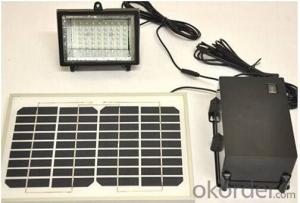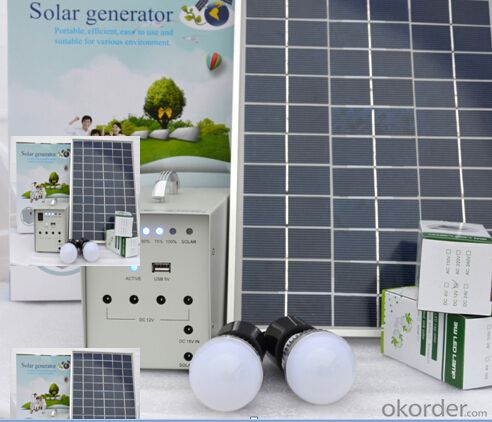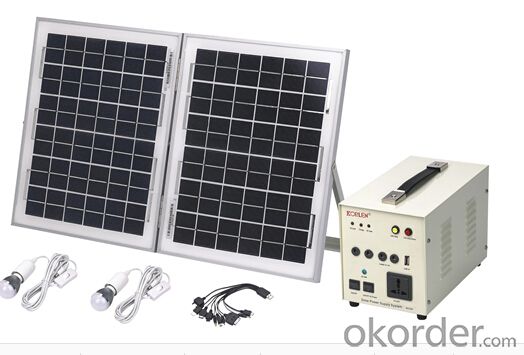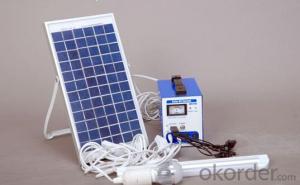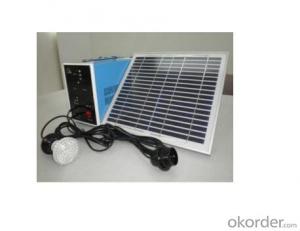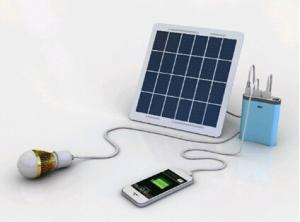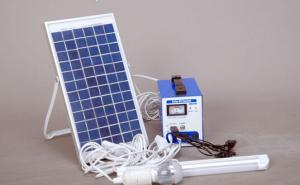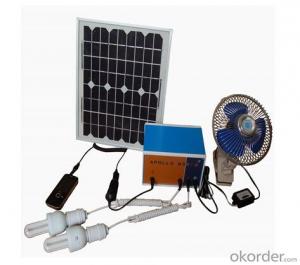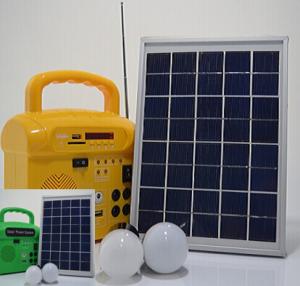Solar Energy Systems Fort Wayne - CNBM Solar Home System Roof System Capacity-25W-3
- Loading Port:
- Shanghai
- Payment Terms:
- TT or LC
- Min Order Qty:
- 10 set
- Supply Capability:
- 30000 set/month
OKorder Service Pledge
OKorder Financial Service
You Might Also Like
Introduction of Solar Home System
Solar Home System is composed by Solar Panels, Inverters, Charger Controller, Battery, Cable, Mounting Bracket, which is applied to produce electricity for home use.
Solar Home System is quite suitable product in urban area and the place which is short of electricity. Our Small Solar Home System own great benifits compare with other kind electricity resources:
Electricity generating cost of Solar Home System is much cheaper than diesel engine. Beside low electricity making cost, solar system products also have the features of noiseless, clean energy, environmentally friendly and can access to many different electric appliance.
Working Principle of Solar Home System
The stand alone Solar Home System is an off-grid solar system which uses batteries to store the solar energy. Stand alone solar system solutions design for those who are not able or willing to connect to electricity grid.
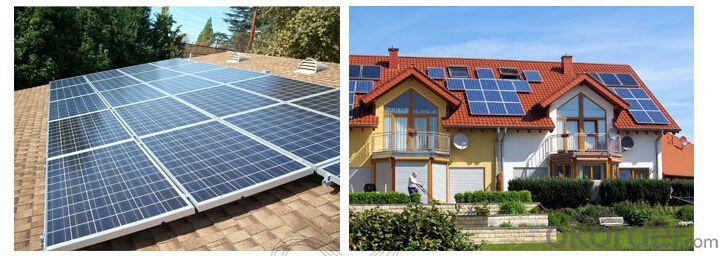


Terms and Conditions
1. Trade terms: FOB Shanghai
2. Payment terms: 30% T/T, balanced before shipment/ LC at sight before shipment. Actual Terms can be negotiated for big order.
3. Package: Exported standard package suitable for tough handling and sea transport.
4. Delivery: Goods to be ready within 10~30 days depending on order quantity.
5. Warranty: 10 years for solar panel, 2 years for controller/inverter/battery.
FAQ
Q: Required mainly certificates (CE&IEC/TUV/RoHS)?
A: Our products are certificated by CE RoHS, IEC, ISO, TUV, UL etc.
- Q: What is the lifespan of solar inverters?
- Solar inverters can have varying lifespans, which are influenced by several factors. On average, most solar inverters last between 10 to 15 years. However, the quality, brand, and specific model of the inverter can impact its lifespan. Lower-quality inverters tend to have shorter lifespans, while higher-quality ones can endure for 20 years or more. To extend the lifespan of solar inverters, regular maintenance and proper installation are crucial. Keeping the inverter clean, free from dust or debris, and safeguarded from extreme weather conditions can help prolong its life. It's worth noting that although the inverter's lifespan may be shorter compared to the solar panels themselves, it can be replaced relatively easily without needing to replace the entire solar system. Furthermore, as inverter technology advances, upgrading to a newer and more efficient model becomes a possibility once the initial inverter reaches the end of its life. In conclusion, while the lifespan of solar inverters can differ, with adequate maintenance and high-quality equipment, they can deliver reliable performance for a significant duration.
- Q: How does the location of a solar energy system affect its performance?
- The location of a solar energy system has a significant impact on its performance. Various factors such as latitude, climate, shading, and orientation play a crucial role in determining the efficiency and effectiveness of a solar energy system. Firstly, the latitude of the location affects the amount of solar radiation received. Areas closer to the equator receive more direct sunlight throughout the year, resulting in higher solar energy production. Conversely, regions located further away from the equator receive less direct sunlight and may experience lower solar energy generation. Climate also influences the performance of a solar energy system. Regions with clear skies and ample sunshine tend to have higher solar energy potential compared to areas with frequent cloud cover or a higher number of rainy days. Additionally, extreme temperatures can also impact the efficiency of solar panels, as excessive heat can reduce their output efficiency. Shading is another crucial factor to consider when installing a solar energy system. Shadows from nearby buildings, trees, or other obstructions can significantly decrease the amount of sunlight reaching the solar panels. Even partial shading on a small portion of the panels can disproportionately impact the overall system's performance, resulting in reduced energy production. The orientation of the solar panels also affects system performance. The ideal orientation for solar panels is typically facing south in the Northern Hemisphere and north in the Southern Hemisphere. This allows panels to receive the maximum amount of sunlight throughout the day. However, deviations from the optimal orientation can still be efficient, albeit with slightly reduced performance. In conclusion, the location of a solar energy system has a direct impact on its performance. Factors such as latitude, climate, shading, and orientation all influence the efficiency and effectiveness of solar energy production. Considering these factors during the planning and installation process is crucial to maximizing the potential of solar energy systems.
- Q: Can solar energy systems be used in remote areas without access to the power grid?
- Solar energy systems are indeed suitable for use in remote areas that lack access to the power grid. In fact, solar power often proves to be the perfect solution for such locations. These systems are comprised of solar panels that convert sunlight into electricity, which can then be used to power a variety of appliances and devices. Typically, off-grid remote areas do not have access to conventional electricity sources like power lines. However, solar energy systems offer an independent and sustainable power source. By harnessing the ample sunlight available in these areas, solar panels can generate electricity even without a power grid. In remote areas, solar energy systems can be designed to store excess energy in batteries. This ensures a continuous power supply, even on cloudy days or during the night. These battery systems enable the storage of solar-generated electricity, providing a dependable power source for various needs, such as lighting, communication devices, water pumps, refrigeration, and even small businesses. Moreover, the installation and upkeep of solar energy systems in remote areas are often more cost-effective compared to extending power lines from the grid. Solar panels have become increasingly affordable in recent years, and advancements in technology have boosted their efficiency and durability. Additionally, the absence of fuel expenses and the minimal requirement for ongoing maintenance make solar energy systems a sustainable and cost-efficient solution for remote areas. All in all, solar energy systems are an excellent choice for powering remote areas without access to the power grid. They offer a sustainable, reliable, and cost-effective source of electricity, enabling the growth and enhancement of communities in these remote locations.
- Q: Can solar energy systems be used in areas with limited access to solar junction boxes?
- Yes, solar energy systems can still be used in areas with limited access to solar junction boxes. In such cases, alternative solutions like off-grid systems with batteries or decentralized microgrid setups can be employed to harness and store solar energy. These options allow for the utilization of solar power even in areas where grid connection or access to solar junction boxes is limited or not possible.
- Q: Can a solar energy system be installed on a hospital or healthcare facility?
- Yes, a solar energy system can be installed on a hospital or healthcare facility. In fact, many hospitals and healthcare facilities around the world have already implemented solar energy systems as a way to reduce their carbon footprint and lower their energy costs. Solar panels can be installed on the rooftop of the facility or in an adjacent open space, depending on the available area. These systems can generate electricity from sunlight, which can be used to power various operations within the hospital, including lighting, heating, and cooling systems, as well as medical equipment. The use of solar energy not only helps the facility save on energy costs but also promotes sustainability and environmental responsibility. Additionally, solar energy systems can provide a reliable and independent source of power, which can be crucial during emergencies or power outages, ensuring uninterrupted healthcare services.
- Q: Can solar energy systems be used in powering music studios or recording studios?
- Certainly, music studios or recording studios can definitely utilize solar energy systems for power. Solar power systems present a clean and renewable energy source that offers a reliable and economical solution for operating various electrical equipment, including the energy-intensive equipment typically found in music studios. To harness sunlight and convert it into electricity, solar panels can be installed on the studio building's roof or any other suitable area. This generated electricity can then effectively power a diverse range of equipment, such as amplifiers, mixers, microphones, computers, lighting fixtures, and air conditioning systems. The required size of the solar power system will depend on the studio's energy needs. By analyzing the studio's energy consumption patterns and demands, solar energy experts can design and install a tailor-made solar power system that perfectly suits the studio's specific requirements. One major advantage of utilizing solar energy in music studios is the potential for significant cost savings. Traditional electricity sources, especially in commercial settings, can be quite expensive. However, by generating their own electricity through solar power, studios can reduce their reliance on the grid and potentially diminish their electricity bills. Furthermore, solar energy is an environmentally friendly and sustainable option. Music studios often consume a substantial amount of electricity, and using solar power can help minimize their carbon footprint and contribute to a more environmentally conscious future. It is important to note that solar energy systems can also be combined with battery storage systems. This allows music studios to store excess energy produced during the day and utilize it during periods of low solar generation or at night. This further enhances the reliability and independence of the solar power system. In conclusion, solar energy systems can be effectively employed to power music studios or recording studios. They provide a clean, renewable, and cost-effective solution that can meet the energy demands of these facilities while simultaneously reducing their environmental impact.
- Q: Can solar energy systems be used for powering electric vehicle research and development centers?
- Yes, solar energy systems can be used to power electric vehicle research and development centers. Solar panels can generate electricity from sunlight, which can be used to power the facilities and provide a sustainable and renewable energy source for the centers' operations. This can greatly contribute to reducing carbon emissions and promoting green and clean energy practices in the electric vehicle industry.
- Q: Can solar energy systems be used in areas with limited access to training programs?
- Yes, solar energy systems can be used in areas with limited access to training programs. While training programs can provide valuable knowledge and skills in installing and maintaining solar energy systems, there are alternative resources available. Online courses, instructional videos, and manuals can offer self-learning opportunities for individuals in areas with limited access to training programs. Additionally, local technicians with expertise in solar energy can be trained to support the installation and maintenance of these systems, ensuring the utilization of solar energy even in areas with limited training resources.
- Q: Can solar energy systems be used in areas with limited access to solar monitoring systems?
- Yes, solar energy systems can still be used in areas with limited access to solar monitoring systems. While solar monitoring systems can provide valuable data and insights for optimizing the performance of solar energy systems, they are not essential for the basic functionality of the systems. Solar panels can still generate electricity from sunlight even without monitoring systems. However, without access to solar monitoring systems, it may be more challenging to track and assess the performance, diagnose issues, and monitor the overall efficiency of the solar energy systems.
- Q: How do solar energy systems impact the reliability of the electricity supply?
- Solar energy systems can enhance the reliability of the electricity supply by diversifying the energy sources. These systems provide a decentralized approach to power generation, reducing the dependence on centralized power plants. This diversification helps minimize the risk of blackouts or disruptions caused by issues in the traditional electricity grid. Additionally, solar energy systems can also offer backup power during grid outages, contributing to a more resilient and reliable electricity supply.
Send your message to us
Solar Energy Systems Fort Wayne - CNBM Solar Home System Roof System Capacity-25W-3
- Loading Port:
- Shanghai
- Payment Terms:
- TT or LC
- Min Order Qty:
- 10 set
- Supply Capability:
- 30000 set/month
OKorder Service Pledge
OKorder Financial Service
Similar products
Hot products
Hot Searches
Related keywords
